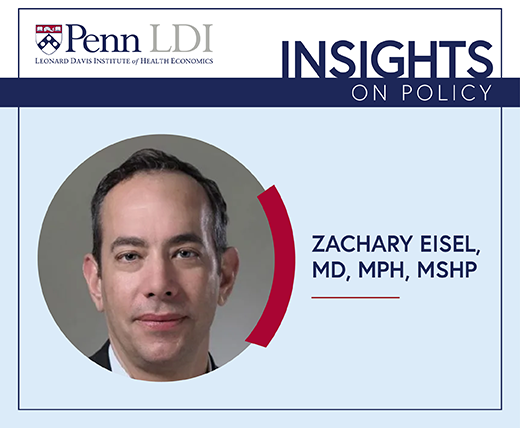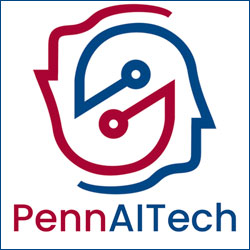
Estimated Overdose Deaths Due to the Loss of MOUD in the One Big Beautiful Bill Act
Research Memo: Delivered to House Speaker Mike Johnson and Majority Leader John Thune
Improving Care for Older Adults
News
A new University of Pennsylvania research center focused on developing innovative technologies to improve care and living supports for older adults has received a grant from the National Institute of Aging that could total $20 million over five years.
The new center ‑ the Penn Artificial Intelligence and Technology Collaboratory for Healthy Aging (PennAITech) ‑ is led by LDI Senior Fellows George Demiris and Jason Karlawish, and by Jason Moore, PhD, FACMI, Chair of Computational Biomedicine at Cedar Sinai.

Demiris, PhD, FACMI, is both Professor of Biobehavioral Health Sciences at the Penn School of Nursing, and of Epidemiology and Informatics at the Perelman School of Medicine. He has already gained national recognition for his “smart home” research approach. His prototype systems wire an older adult’s home with AI-augmented motion sensors, video cameras, and digital controls on kitchen appliances, washers, dryers, HVAC functions, locks, TVs, and more. All are interconnected via an in-home network hub tethered to caregivers’ smartphones.

Karlawish, MD, is an internationally recognized expert in the field of Alzheimer’s and related dementia treatment. He is a Professor of Medicine, Medical Ethics and Health Policy, and Neurology at the Perelman School of Medicine. He is also Director of the Penn Program on Precision Medicine for the Brain, Co-Associate Director of the Alzheimer’s Disease Research Center, and Co-Director of the Penn Memory Center.
Designed as a “Collaboratory,” the new PennAITech center will draw on researchers across the campus. It plans to soon issue requests for proposals for pilot research grants in its target areas. Its news announcement explains:
“PennAITech aims to identify, develop, evaluate, commercialize, and disseminate innovative technology and artificial intelligence (AI) methods and software to support older adults and those with Alzheimer’s Disease (AD) and Alzheimer’s Disease and Related Diseases in their home environment. It is motivated by the need for a comprehensive pipeline from technology-based monitoring of older adults in the home, collection and processing monitoring data, integration of that data with clinical data from electronic health records, analysis with cutting-edge AI methods and software, and deployment of validated AI models at point of care for decision support.”

To begin its work, PennAITech has established collaborative affiliations with the Penn Memory Center, the NewCourtland Center for Transitions and Health, the Institute of Biomedical Informatics, the Center for Neuroscience and Society, the Center for Neuroengineering and Therapeutics, and the Penn School of Nursing Home Care Suite.
“We need innovative solutions that will help us detect risks, address disparities, support decision making, and improve access to care,” said Demiris. “The overarching goal of our Collaboratory is to facilitate the development and dissemination of such tools.”
“Penn is uniquely poised to serve as a research and innovation accelerator based on our expertise in geriatric medicine, aging, Alzheimer’s Disease, and biomedical informatics,” said Karlawish. “We aim to advance the development of effective solutions that will be used in the real world and ultimately improve the lives of older adults and their caregivers.”

Research Memo: Delivered to House Speaker Mike Johnson and Majority Leader John Thune

Research Memo: Delivered to House Speaker Mike Johnson and Majority Leader John Thune

Hospitals’ Current Cost Reports are Unreliable and Should be Improved, LDI Fellow Finds

If Federal Support Falls, States May Slash Home- and Community-Based Services — Pushing Vulnerable Americans Into Nursing Homes They Don’t Want or Need

Historic Coverage Loss Could Cause Over 51,000 People to Lose Their Lives Each Year, New Analysis Finds

Cited for “Breaking New Ground” in the Field of Hospital Operations